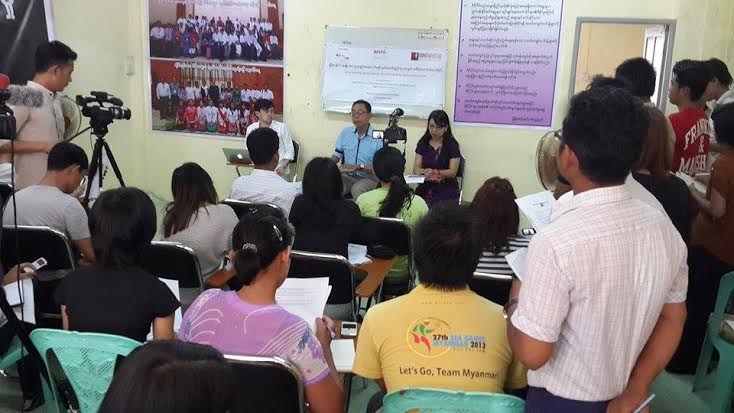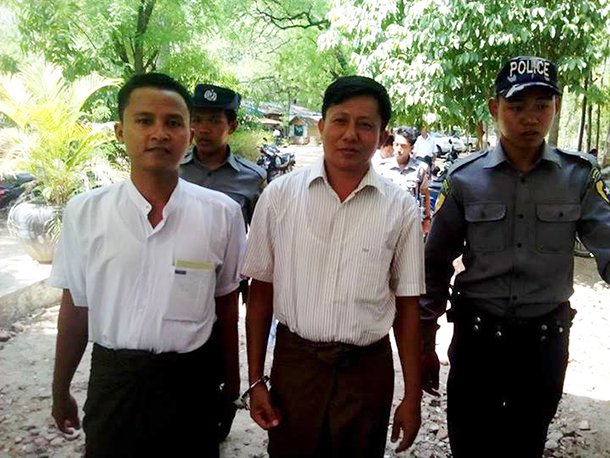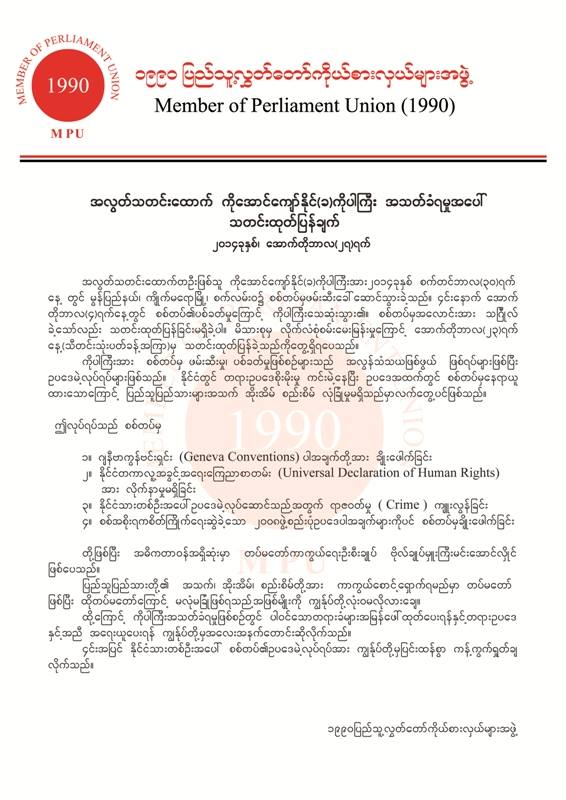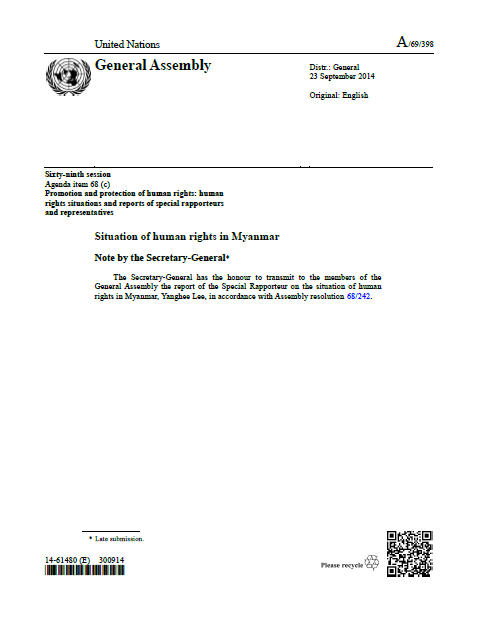Posts Tagged ‘Journalists’ (41 found)
AAPP’s Statement Regarding the Death of Freelance Journalist Aung Kyaw Naing, aka Par Gyi
The death of well known freelance journalist Aung Kyaw Naing, aka Par Gyi, while in military custody in Kyaikmayaw Township, Mon State, comes as a shocking reminder of how extrajudicial killings, arbitrary detention and torture are still being used against citizens in Burma […]
• • •BURMA: Killing of Mr. Aung Kyaw Naing
The Observatory for the Protection of Human Rights Defenders, a joint programme of the International Federation for Human Rights (FIDH) and the World Organisation Against Torture (OMCT), requests your urgent intervention in the following situation in Burma […]
• • •ႏိုင္ငံသားတစ္ဦးျဖစ္သူ ကိုပါႀကီး(ခ)ကိုေအာင္ေက်ာ္ႏိုင္ ေသဆံုးခဲ့ရျခင္းအတြက္ ဒီမိုကရက္တစ္ အင္အားစုမ်ား၏ စုေပါင္း သေဘာထား ထုတ္ျပန္ေၾကညာခ်က္
၂၀၁၄ ခုႏွစ္၊ ေအာက္တိုဘာ (၂၃) ရက္ေန႔တြင္ ျမန္မာႏိုင္ငံစာနယ္ဇင္းေကာင္စီ (ယာယီ)သို႔ တစ္လၾကာ အဖမ္းခံထားရေသာ ကိုပါႀကီး (ခ) ကိုေအာင္ေက်ာ္ႏိုင္ သည္ (၄၊၁ဝ၊၂ဝ၁၄) ရက္ေန႔ ညေန၌ ပစ္ခတ္ခံရ၍
ေသဆံုး သြားေၾကာင္း ကာကြယ္ေရး ဝန္ႀကီးဌာနမွ အေၾကာင္းၾကားလာျခင္းႏွင့္ ပတ္သက္ၿပီး ဒီမိုကရက္တစ္ အင္အားစုမ်ား စုေပါင္း၍ ေအာက္ပါအတိုင္း ထုတ္ျပန္ေၾကညာ လုိက္ပါသည္။ […]
Journalist Killed in Military Custody in Burma
Bangkok, October 24, 2014–Burma’s army shot dead freelance reporter Aung Kyaw Naing while the journalist was in military custody, according to news reports. The Committee to Protect Journalists condemns the journalist’s killing, the first in Burma since 2007[…]
• • •Document – Myanmar: Media Workers Jailed for Two Years
Five media workers have been sentenced to two years in prison in Myanmar over the publication of a news story. They are prisoners of conscience, detained solely for peacefully exercising their right to freedom of expression […]
• • •69th Session of the UN General Assembly – Situation of human rights in Myanmar: Report of the Special Rapporteur on the situation of human rights in Myanmar
I. The mandate of the Special Rapporteur on the situation of human rights in Myanmar was established pursuant to Commission on Human Rights resolution 1992/58 and recently extended by Human Rights Council resolution 25/26. The present report is submitted pursuant to Council resolution 25/26 and General Assembly resolution 68/242.
II. Background
2. Following the completion of the term of the previous mandate holder, the current mandate holder took up her functions only in June 2014, which resulted in a shorter period than usual to conduct a country visit and review the information gathered. The present report therefore sets out the Special Rapporteur’s preliminary observations, to be supplemented by her oral statement to the General Assembly […]
• • •Myanmar: Imprisoned Media Workers’ Sentences Reduced
URGENT ACTION
imprisoned media workers’ sentences reduced
Five media workers from Unity newspaper in Myanmar had their sentences reduced on appeal to seven years’ imprisonment. They were jailed in connection with their journalistic activities and are prisoners of conscience who must be immediately and unconditionally released. […]
• • •The Myanmar National Human Rights Commission Continues Failing to Deliver
 A report authored by Burma Partnership and Equality Myanmar was launched on 25 September 2014 in Rangoon revealing the continuing ineffectiveness of the Myanmar National Human Rights Commission (MNHRC) as well as the lack of independence from the government. The report was launched on the same day that a reshuffle of the members of MNHRC was announced by the government, which came as a complete surprise to civil society organizations due to the lack of consultation.
A report authored by Burma Partnership and Equality Myanmar was launched on 25 September 2014 in Rangoon revealing the continuing ineffectiveness of the Myanmar National Human Rights Commission (MNHRC) as well as the lack of independence from the government. The report was launched on the same day that a reshuffle of the members of MNHRC was announced by the government, which came as a complete surprise to civil society organizations due to the lack of consultation.
Released at the Myanmar Journalists Network in Rangoon, Burma: All the President’s Men, contributed to the annual Asian NGO Network on National Human Rights Institutions (ANNI) Report on the Performance and Establishment of National Human Rights Institutions in Asia (2014). The report analyzes the Myanmar National Human Rights Commission Law 2014 enacted in March this year (enabling law) that institutionalizes the mandate of the MNHRC. The report finds that the law does not guarantee independence from the government and in particular, the president’s office. In contravention of international standards on national human rights institutions, namely the Paris Principles, the selection process does not adequately consult with civil society. As the report points out, “It is up to the selection board to come up with procedures for short-listing candidates, yet the enabling law itself should set out the process/procedure for selection, with consultations with civil society.” The members of the MNHRC are actually chosen by a selection board of ten, five of which are from the government or are government-affiliated. The enabling law states that two members of this board are to come from civil society organizations and a further two are to be MP, yet there is no transparency regarding the procedures under which the two MPs are chosen. Additionally, the chosen civil society members to the selection board are restricted to registered civil society only, thus excluding many outspoken and critical political and human rights groups who feel they cannot register under the current climate […]
• • •Draconian Sentences of Unity Weekly Journalists Must at the Very Least be Drastically Reduced
 On Thursday 28 August, lawyer Robert San Aung submitted to Magwe regional court the final appeal against the harsh verdicts brought against the five Unity Weekly journalists on10 July. They were sentenced to ten years’ imprisonment with hard labor following the publication of a report in January of this year that gave details of an alleged chemical weapons facility in central Burma. They were charged for trespass and for “disclosing state secrets” in violation of the 1923 Official Secrets Act (OSA). Robert San Aung submitted the appeal on the grounds that the four reporters are innocent and should therefore be released from prison, and that the sentence of the journal’s executive be reduced by half. The Magwe regional court is expected to issue a decision within a month.
On Thursday 28 August, lawyer Robert San Aung submitted to Magwe regional court the final appeal against the harsh verdicts brought against the five Unity Weekly journalists on10 July. They were sentenced to ten years’ imprisonment with hard labor following the publication of a report in January of this year that gave details of an alleged chemical weapons facility in central Burma. They were charged for trespass and for “disclosing state secrets” in violation of the 1923 Official Secrets Act (OSA). Robert San Aung submitted the appeal on the grounds that the four reporters are innocent and should therefore be released from prison, and that the sentence of the journal’s executive be reduced by half. The Magwe regional court is expected to issue a decision within a month.
While the offense under Section 3(1)(a) of the OSA is a strict liability offense – meaning that the prosecution only has to prove that the defendants were in the vicinity of the prohibited place for them to be found guilty – in order for the other convictions to stand, the burden is on the prosecution to show that the secrets alleged to have been leaked were intended to or were likely to have breached state security or assisted an enemy. The journalists must be shown to have leaked detailed and useful information, to have done more than just report that the facility was a weapons factory. It is not clear that the prosecution ever satisfied this requirement.
Even so, if the appeal submission fails to convince the court either that the journalists are not guilty of any substantive offenses, or that there are specific and legitimate defenses under the OSA that can be relied upon, then at the very least the appeal should be successful on grounds of mitigation regarding the alleged offenses, meaning that the sentences should at a minimum be drastically reduced […]
• • •










 All posts
All posts